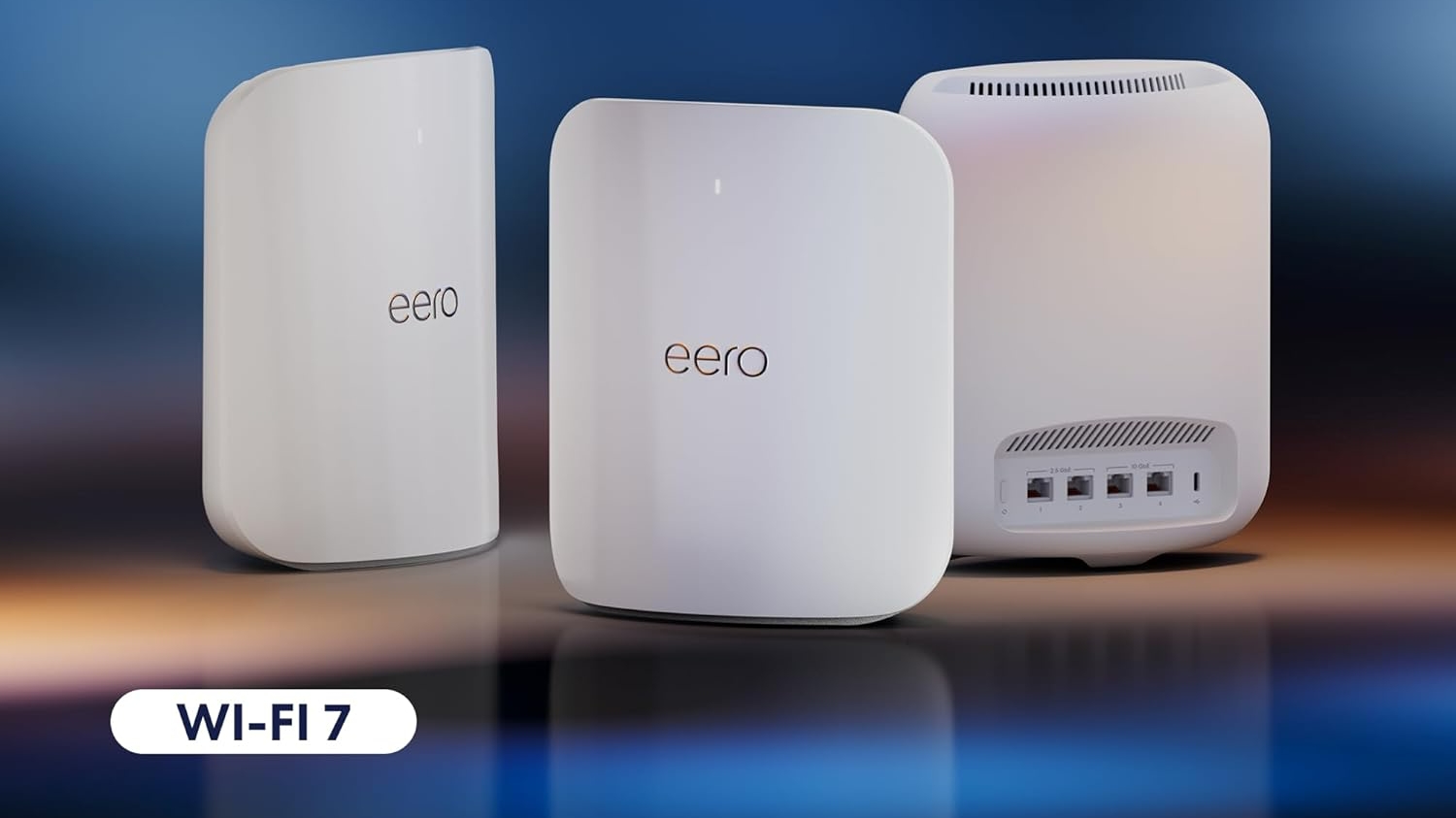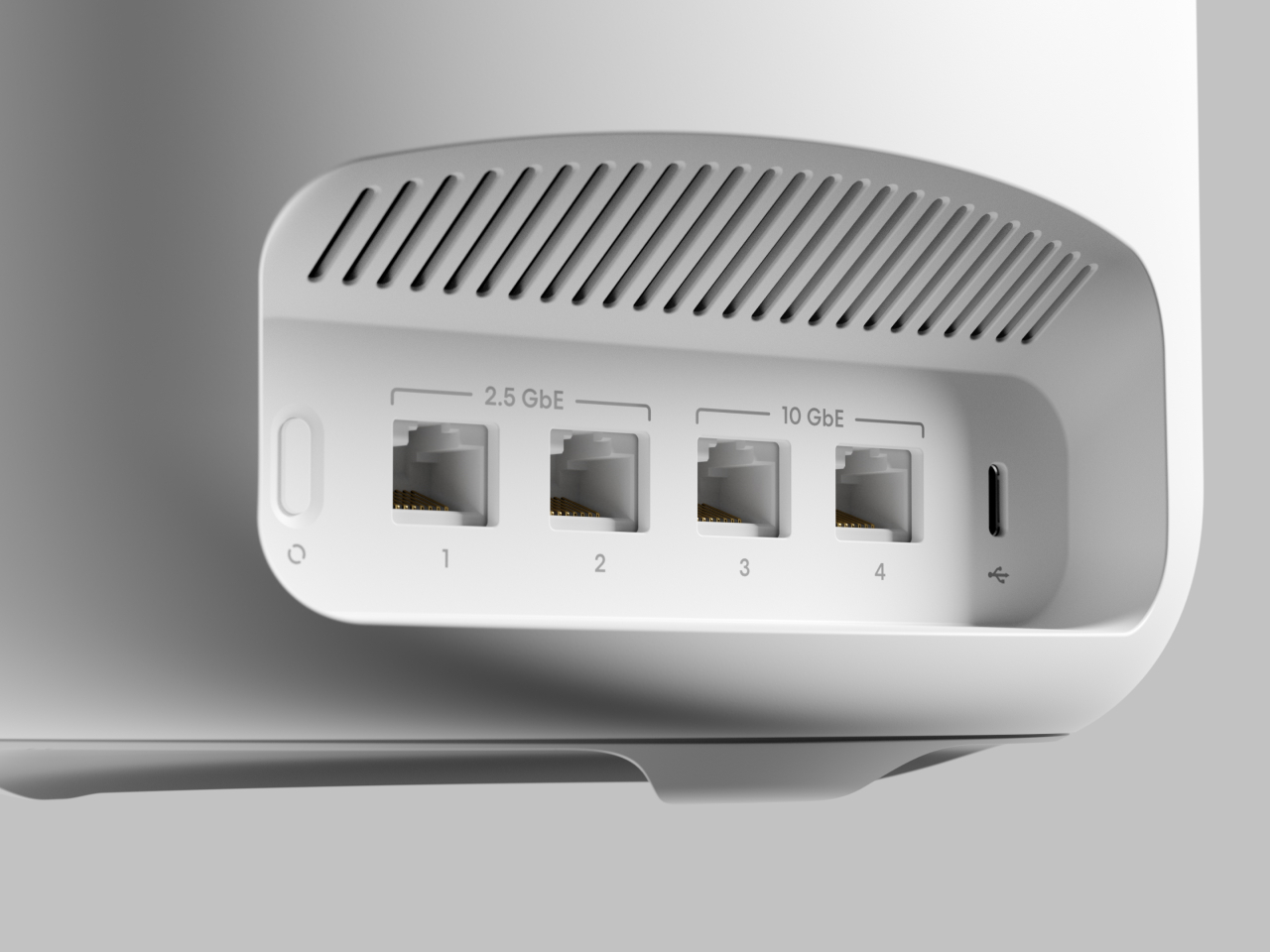Amazon Debuts Eero Max 7 Wi-Fi 7 Mesh Router
Amazon brings Wi-Fi 7 to the Eero mesh router family

Earlier this week, Netgear announced a new Wi-Fi 7 mesh router that impressed us with its performance potential but left us floored by its price tag. (The Orbi 970 retails at $1,699 for a router and satellite, or $2,299 for a router and two satellites.) Well, now Amazon is stepping into the Wi-Fi 7 fray with its latest Eero family member: the Eero Max 7.
The Eero Max 7 offers significant performance and useability upgrades over the current Eero Pro 6E. For starters, the Wi-Fi 7 spec brings features such as 320MHz bandwidth channels (up from 160Hz on Wi-Fi 6E) to the Eero Max 7. The mesh router supports legacy 2.4GHz and 5GHz bands along with the new 6GHz band. Wired speeds max out at 9.4 Gbps, while wireless rates are capped at 4.3 Gbps.
Unlike the Orbi 970, the Eero Max 7 doesn’t have a dedicated wireless backhaul. Instead, the router will default to the 6GHz channel to communicate with its satellite — then fall back to 5GHz or 2.4GHz as needed, depending on connection strength. Since this is an Amazon product, the Eero is also a smart home hub supporting Alexa, Zigbee, and Thread devices.
While wireless performance should no doubt be respectable with the Eero Max 7, Amazon is also throwing a bone to customers who need physical Ethernet ports. Instead of just two Ethernet ports (one 2.5 Gbps, one 1 Gbps), the Eero Max 7 will have two 10 Gbps and two 2.5 Gbps Ethernet ports. And one of the 10 Gbps ports can accommodate fiber internet — for those with access to such luxuries.

Compared to the Eero Pro 6E, the Eero Max 7 is a giant. Each Eero Pro 6E node measures 5.5 inches across and is 1.9 inches tall. The towering Eero Max 7, meanwhile, is 7.24 inches wide and 8.73 inches tall.
The cheapest Wi-Fi 7 router we saw prior to the Eero Max 7 was the $599 TP-Link Archer BE800. The Eero Max 7 will also cost $599 for a single node (2,500 sq. ft. coverage). If you want to add a node, a two-pack will cost $1,149 (5,000 sq. ft.), while a three-node mesh system will set you back $1,699 (7,500 sq. ft.).
Those prices will be a tough pill to swallow for many consumers, especially compared to the cost of current-generation Wi-Fi 6E mesh routers. A single Eero Pro 6E node costs $179, while a two-pack costs $279 from Amazon. Even a three-pack costs just $399 — still $200 less than one Eero Max 7 node.
Get Tom's Hardware's best news and in-depth reviews, straight to your inbox.
Amazon has not yet given a release date for the Eero Max 7, and the product page only states it will be "coming soon."

Brandon Hill is a senior editor at Tom's Hardware. He has written about PC and Mac tech since the late 1990s with bylines at AnandTech, DailyTech, and Hot Hardware. When he is not consuming copious amounts of tech news, he can be found enjoying the NC mountains or the beach with his wife and two sons.
-
richardvday They say if you build it they will come but these prices are crazy....Reply
Some people have more money then sense though.
As for me I will wait a couple of years unless I hit the lottery that's just too rich for me. -
EyadSoftwareEngineer Hyped price for hyped tech still need time to reach the full speed if wifi7 , wifi 6 is more than enough for our daily applicationsReply -
tronixa2 I would definitely buy a 3-pack of these if the price wasn't so outrageously high. With my home network as complicated as it is, I could really use an Eero with multiple LAN ports but at its current price, I may as well just go buy a switch and plug it into the back of my existing Eero.Reply
Between outrageous graphics cards and motherboard prices, the last thing we need now is crazy expensive network gear.